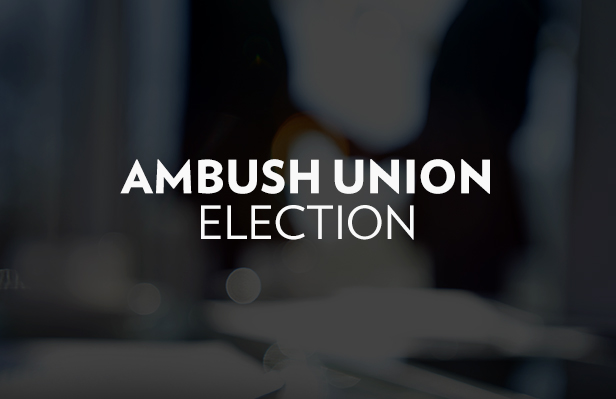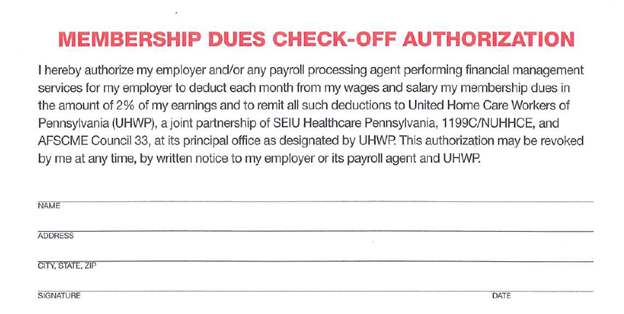Memo

Gov. Wolf’s Stealth Unionization of Home Health Care Workers
Introduction
On February 27, Gov. Wolf issued an executive order paving the way for unionization of homecare workers in Pennsylvania. These workers provide in-home medical and personal care, allowing disabled and elderly Pennsylvanians to receive necessary treatments and support in the comfort and privacy of their own home. Many of these workers are simply taking care of a family member or loved one and have no connection to government employment. Yet, Gov. Wolf is pushing to unionize these workers, a move that will greatly benefit two of the governor’s most generous campaign contributors.
Scope of the Executive Order
The governor’s executive order is a stealth unionization effort allowing the Service Employees International Union (SEIU) and American Federation of State, County and Municipal Employees (AFSCME)—two of the governor’s largest campaign contributors—to organize homecare workers, which would add millions of dollars to these unions’ coffers by skimming dues off of Medicaid payments to homecare workers.
Here are the specifics of the executive order:
- Allows unions like SEIU and AFSCME to organize Direct Care Workers.
- Directs the Department of Human Services (DHS) to provide the unions with a list of all homecare workers with their names and home addresses to help SEIU and AFSCME organize.
- Allows SEIU and AFSCME to become the exclusive representative of homecare workers as the “Direct Care Worker Representative.”
- Allows the Secretary of Human Services to negotiate with the “Direct Care Worker Representative” over compensation, procedures, and voluntary payroll deductions of union dues.
- Gives permission to the DHS to implement changes in policy agreed to between the governor and unions during the “meet and confer process” and agreed to in a “memorandum of mutual understanding,” which resembles a collective bargaining agreement.
-
- To call an election, unions only need 10 percent of homecare workers to express interest in organizing, far lower than the 30 percent threshold required by current labor laws.
- The American Arbitration Association is responsible for conducting the election to determine the exclusive representative of homecare workers, not the Pennsylvania Labor Relations Board, which is the standard in other cases involving public sector unions.
- SEIU and AFSCME only need a majority of votes cast to win the right to be the exclusive representative of homecare workers.
DHS has already provided a list of approximately 20,000 homecare workers to the United Home Care Workers of Pennsylvania, a union that is the joint effort of SEIU and AFSCME. This has enabled the group to send out ballots for a union election that ends on April 23.
The table below describes Gov. Wolf’s executive order (2015-05) and compares it with Gov. Rendell’s 2010 executive order (discussed below) along with the union organizing provisions of the Pennsylvania Labor Relations Act, and Pennsylvania Public Employe Relations Act.
|
|
Executive Order 2015-05 |
Executive Order 2010-04 |
Pennsylvania Labor Relations Act |
Public Employe Relations Act |
|
Individuals Covered |
“Direct Care Workers”: Generally, consumer-directed, non-agency homecare workers providing services through various Office of Long Term Living programs (Executive Order 2015-05, 1.c., f, i) |
“Individual Providers”: Generally, consumer-directed, non-agency homecare workers providing services through various Office of Long Term Living programs (Executive Order 2010-04, 1.a) |
Nonpublic employees not covered by the NLRA (PLRA specifically excludes “any individual employed . . . in the domestic service of any person in the home of such person”) (43 P.S. § 211.3(c),(d)) |
“Public” or “Commonwealth” employees employed by a “public employer” (Wolf's EO states that workers are not “Commonwealth employees”) (43 P.S. § 1101.301(1)) |
|
Bargaining Unit Designation Authority |
Executive Order itself (3) |
Executive Order itself (1) |
Pennsylvania Labor Relations Board (43 P.S. § 211.7(b)) |
Pennsylvania Labor Relations Board (43 P.S. §§ 1101.602(a), 43 P.S. §§ 1101.604) |
|
Portion of Prospective Bargaining Unit Needed to Call Election |
10% (3.a. (1),(2)) |
10% (1.c) |
30% (43 P.S. § 211.7(c)) |
30% (43 P.S. § 1101.603(a)) |
|
Collector of Signed Authorization Cards |
Governor or Governor's designee (3.a (1)) |
Secretary of Labor and Industry (1.c) |
Pennsylvania Labor Relations Board (43 P.S. § 211.7(c)) |
Pennsylvania Labor Relations Board (43 P.S. § 1101.603(c)) |
|
Notice Period Prior to Election |
None |
30 days (1.c) |
Discretion of Pennsylvania Labor Relations Board |
10 days (43 P.S. § 1101.605(a)) |
|
Conduct Elections and Certify Results |
American Arbitration Association (3.a) |
American Arbitration Association (1.c) |
Pennsylvania Labor Relations Board (43 P.S. § 211.7(c)) |
Pennsylvania Labor Relations Board (43 P.S. § 1101.605(6)) |
|
Percentage of Vote Required for “Exclusive Representative” Status |
Majority of those voting (3.a (2)) |
Majority of those voting (1.d) |
Majority of employees in the prospective bargaining unit (43 P.S. § 211.7(a)) |
Majority of those voting (43 P.S. § 1101.605(3)) |
|
Negotiation Process |
DHS Secretary required to “meet and confer” with representative (3.b) |
OLTL or Secretaries of Aging and DPW to “engage in negotiations” with representative (2) |
Employer and representative must bargain (43 P.S. § 211.6(1)(e)) |
Employer and representative must “meet and confer” (43 P.S. § 1101.701) |
|
Result |
Exclusive representative and DHS Secretary memorialize agreements in “memoranda of mutual understanding” and the MOUs may be “implemented as the policy of the Department” (3.c) |
“Agreements” between the parties memorialized in writing, and can “require state and federal regulatory or legislative action” (3) |
“Agreement” See 43 P.S. §§ 211.6, 211.8. |
Agreements between the parties are memorialized in a collective bargaining agreement (43 P.S. § 1101.901) |
Legal Concerns
Gov. Wolf’s decision to create guidelines for a union election by executive fiat flies in the face of the governor’s promise to give Pennsylvania a “fresh start.” According to the Fairness Center, a nonprofit, public interest legal firm, the governor’s move violates Pennsylvania’s Constitution for two reasons.
First, no governor is permitted to make law by executive order, which is exactly what this order does through its attempt to change long-standing processes for union elections.
Second, the order explicitly contradicts a state statute. The Pennsylvania Labor Relations Act expressly prohibits unionization of workers, “in the domestic service of any person in the home of such person, or any individual employed by his parent or spouse.” This section includes workers in the homecare industry.
Gov. Rendell issued a similar executive order in 2010 (Executive Order 2010-04 in the table above), but he withdrew the order after the Commonwealth Court issued an injunction against the action. Unfortunately, the court’s 2010 decision didn’t dissuade Gov. Wolf from moving forward with his executive order, necessitating lawsuits by the Fairness Center and the Pennsylvania Homecare Association, with United Cerebral Palsy of Pennsylvania joining the latter group in their lawsuit.
As the table above demonstrates, both Gov. Rendell’s attempt and Gov. Wolf’s attempt (Executive Order 2015-05) to unionize homecare workers is inconsistent with the laws governing unionization in Pennsylvania.
Implications for Homecare Workers and Patients
While the legal ramifications of the governor’s move are troubling, the impact it will have on the unique relationship between many homecare workers and recipients, Don Lambrecht and Dave Smith, is even more distressing. The potential union and government intrusion on Dave and Don’s relationship is the reason why the Fairness Center has filed a lawsuit on behalf of both men.
Dave, whose muscular dystrophy has left him wheelchair-bound, and Don, Dave’s homecare provider of 25 years, have become close friends. They see each other as family rather than as an employer and employee, but Gov. Wolf’s order threatens to put the SEIU and AFSCME between the two men. Even though Don may not be required to pay dues, he would still be forced to accept representation, essentially forcing him to collectively bargain against Dave.
Many of the 20,000 homecare workers who will be forced to accept representation may be put in a similar situation, bringing harm to the special relationship they share with their patients. Instead of working together, homecare workers and patients would be pitted against each other in the negotiation process because under the commonwealth’s long-term care program, the patients are the employers of their homecare worker(s).
The Real Beneficiaries
Who truly benefits from this arrangement? Government union leaders. United Home Care Workers of Pennsylvania has already sent out “dues checkoff authorization” forms to allow deductions of union dues from paychecks in the amount of 2 percent of salary. This dues money comes directly out of Medicaid payment to homecare workers.
Given that DHS provided approximately 20,000 homecare worker addresses to United Home Care Workers of Pennsylvania, at 2 percent of earnings, the union could collect an estimated $8.4 million in union dues annually from this dues skim.
Gov. Wolf also stands to benefit from this skimming of Medicaid dollars for union dues. AFSCME and SEIU contributed more than $1.5 million to Gov. Wolf’s campaign in 2014, while spending hundreds of thousands more in independent expenditures and “SuperPAC” contributions—directly from union dues—to support his election.
Image: Dues Checkoff Authorization Form

Wolf Administration Distortions
Curiously, the governor and those in his administration have denied that his order allows for the organizing of homecare workers.
Myth: This is not organization. Governor Wolf’s spokesman Jeff Sheridan has explicitly stated, “It [the executive order] doesn't allow them to organize.”
Fact: The executive order requires the Direct Care Worker Representative to be:
An employee organization that has as one of its primary purposes the representation of direct care workers in their relations with the Commonwealth or other public entities.
“Employee organization” is simply a legal term for a union. The order specifically allows unions to seek to represent, i.e., organize direct care workers.
Myth: It’s not a union ballot. Sheridan went on to tell the Pittsburgh Post-Gazette, “It’s not a union ballot.”
Fact: The ballot mailed to home health care workers reads “Official Secret Ballot.”
Likewise, United Home Care Workers of Pennsylvania self-describes as “a union” and is a joint project of two other government unions: AFSCME and SEIU. In a mailer sent to homecare workers, they offer “a special message about your union election.” (emphasis added)
Myth: The executive order does not grant collective bargaining. Sheridan also stated that the order doesn’t grant collective bargaining rights.
Fact: Now, while the order does state “The provisions of this Executive Order shall not be construed or interpreted to create collective bargaining rights,” it goes on to create a de facto collective bargaining process for unions by giving them access to the administration to discuss issues normally hammered out during collective bargaining negotiations. Section 3(b) of Gov. Wolf’s executive order gives the exclusive representative permission to “meet and confer,” which is nearly identical to collective bargaining.
Conclusion
If the Wolf Administration is truly concerned about giving homecare workers an opportunity to discuss employment matters, they can do so without forcing representation upon homecare workers who neither need nor want a union to get between them and their patients.
Additional Resources
- Fairness Center Case Backgrounder
- Full Fairness Center Petition
- Pennsylvania Homecare Association Statement
- Pennsylvania Homecare Association and United Cerebral Palsy of Pennsylvania Petition
- United Home Care Workers of Pennsylvania mailer sent to homecare workers
- Copy of Union Ballot
- United Home Care Workers “Dues Checkoff Authorization”
# # #
Bob Dick is a policy analyst and Nathan Benefield is vice president of policy analysis for the Commonwealth Foundation, http://www.CommonwealthFoundation.org